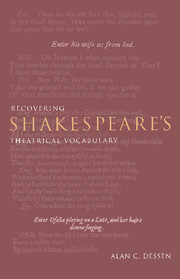Book contents
- Frontmatter
- Contents
- Preface
- Note on texts and old spelling
- 1 The problem, the evidence, and the language barrier
- 2 Lost in translation
- 3 Interpreting without a dictionary
- 4 Juxtapositions
- 5 Theatrical italics
- 6 Sick chairs and sick thrones
- 7 Much virtue in as
- 8 The vocabulary of “place”
- 9 “Romeo opens the tomb”
- 10 Vanish and vanishing
- Conclusion: So what?
- Notes
- Plays and editions cited
- Index
7 - Much virtue in as
Published online by Cambridge University Press: 07 May 2010
- Frontmatter
- Contents
- Preface
- Note on texts and old spelling
- 1 The problem, the evidence, and the language barrier
- 2 Lost in translation
- 3 Interpreting without a dictionary
- 4 Juxtapositions
- 5 Theatrical italics
- 6 Sick chairs and sick thrones
- 7 Much virtue in as
- 8 The vocabulary of “place”
- 9 “Romeo opens the tomb”
- 10 Vanish and vanishing
- Conclusion: So what?
- Notes
- Plays and editions cited
- Index
Summary
“Much virtue in If”
Touchstone, 5.4.97To recover some of the signifiers in that onstage vocabulary shared by Elizabethan playwrights, players, and playgoers requires only a sampling of a sufficient number of plays. The modern reader (or editor) of 3 Henry VI or 2 Henry IV may not fully understand the theatrical use and potential significance of the sick-chair, but the evidence for the existence of such a visible (and practical) property is plentiful. As noted in chapters 2 and 3, comparable evidence from stage directions and dialogue can be found for other items widely used then but easily missed or misunderstood today (e.g., nightgowns, boots, disheveled hair, torches-tapers). In a few instances, recovering a lost theatrical vocabulary therefore requires little more than a determined look at the plays that have survived.
More often, however, invisible barriers created by an interpreter's unacknowledged assumptions and expectations block this process of recovery. The presence of such barriers should come as no surprise, for theorists and psychologists remind us that observers of phenomena regularly see what they are prepared to see or expect to see. Such predisposition is particularly strong when a reader confronting the drama of the past attempts to extrapolate a sense of staging from words on a page (even when those words come from a playscript actually used in a playhouse).
- Type
- Chapter
- Information
- Recovering Shakespeare's Theatrical Vocabulary , pp. 127 - 149Publisher: Cambridge University PressPrint publication year: 1995



